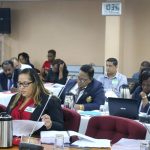CARICOM/CSME: Private Sector Representation

By Elizabeth Morgan
On November 5, Prime Minister Mia Mottley of Barbados, who has lead responsibility in the quasi-Cabinet for the CARICOM Single Market and Economy (CSME), hosted a regional town hall meeting on the CSME. This meeting was scheduled in the lead up to the 49th meeting of the Council for Trade and Economic Development (COTED) to be held on Monday/Tuesday, November 18-19, in Georgetown, Guyana. COTED has responsibility for implementing the CSME. The theme of the town hall meeting was “CSME: What’s in it for me”. A sub-theme was how to bridge the CSME implementation gap. I read that representatives of the regional private sector were present.
The CARICOM Secretary General, Ambassador Irwin LaRocque, in his opening remarks, reiterated that the CSME remains the best platform for achieving sustainable economic growth and development for the Member States and is the platform through which the region will build international competitiveness and economic resilience. The Secretary General mentioned that the CARICOM Private Sector Organization (CPSO) and the Caribbean Congress of Labour (CCL) would be associate members of CARICOM. Prime Minister Mottley has been encouraging the private sector to be more actively engaged in CSME implementation strongly of the view that this engagement is critical to making progress.
In July, at the time of the 40th CARICOM Heads of Government Conference in St. Lucia, it was reported in the regional media that the CPSO has been established. The Communique of the Conference of Heads actually states that Heads welcomed the progress made by the private sector towards establishment of the CPSO which is to be an associate institution of the Community and this is to be finalized by the end of the year. I understand that the CPSO is to replace the long proposed Caribbean Business Council. I did read that it is to be located in Barbados and that it has financing.
My concern is that I have heard nor read nothing further about the CPSO since July. It was not specifically stated that it was represented and participated in the town hall meeting. I am not sure whether it has actually been established and, if so, how is it organized? Who is the chair? Will the CPSO be represented at COTED? The Organization has to be up and running for it to be made an associate institution of the Community. The Caribbean Congress of Labour (CCL) can be made an associate institution because it exists. How well it functions is another matter.
I note that Barbados’ CARICOM Ambassador, David Comissiong, addressed this matter of the participation of the regional stakeholders, private sector, labour and others, in CARICOM’s work in his remarks at the town hall meeting. Comissiong said that the CPSO needed to be established as soon as possible and the CCL needed to be more than a body on paper. For him, it is one thing to call for consultations but it actually requires functioning bodies/institutions and active participants.
So it appears that the CPSO is actually still a work in progress. I hope we will hear more about its current status from next week’s COTED meeting.
I have stated before that participation of civil society (private sector, labour, even academia and the media) in CARICOM and, indeed, in the ACP Caribbean Forum (CARIFORUM), is quite weak. It requires properly functioning institutions, knowledge of the agreements and issues, and transparency. Information should be readily avail and there is need for training exercises and regular engagement. It also requires the commitment of participants and belief in the endeavor. Action more than talk is needed.
Submitted by Elizabeth Morgan, Specialist in International Trade Policy and International Politics
Source: CARICOM TODAY

 Previous Post
Previous Post Next Post
Next Post